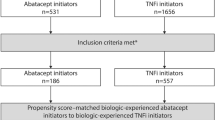Abstract
The introduction of antitumor necrosis factor (TNF) agents has improved the outcome for many patients with rheumatoid arthritis (RA). To date, the only replicated genetic predictor of anti-TNF response is the −308 G > A single-nucleotide polymorphism in the TNF promoter region. The presence of the −308 TNF G/G genotype appears to be a marker of good response to anti-TNF treatment. Anti-citrullinated protein antibodies (ACPA) have been linked with erosive disease, and have been established as the single most reliable prognostic factor in clinical practice. To test the hypothesis that the ACPA status may affect the −308 G/G patients rate of response to TNF blockade, we prospectively investigated a group of 52 RA patients with the −308 G/G genotype who were ACPA (+) or ACPA (−). All patients were treated with adalimumab, and the clinical response was studied using the Disease Activity Score in 28 joints (DAS28) at 24 weeks of treatment. Over 85% of patients were DAS28 responders in both groups. No significant differences were found between patients from both groups, according to the DAS28 criteria of response at week 24 (p = 0.79). In conclusion, our findings suggest that the ACPA status does not affect the clinical response to anti-TNF therapy in −308 TNF G/G patients.
Similar content being viewed by others

References
van der Woude D, Huizinga TW (2008) Translating basic research into clinical rheumatology. Best Pract Res Clin Rheumatol 22:299–310
Senolt L, Vencovsky J, Pavelka K, Ospelt C, Gay S (2009) Prospective new biological therapies for rheumatoid arthritis. Autoimmun Rev 9:102–107
Lee YH, Ji JD, Bae SC, Song GG (2010) Associations between tumor necrosis factor-alpha (TNF-alpha) -308 and -238 G/A polymorphisms and shared epitope status and responsiveness to TNF-alpha blockers in rheumatoid arthritis: a metaanalysis update. Rheumatol 37:740–746
Marotte H, Miossec P (2010) Biomarkers for prediction of TNFalpha blockers response in rheumatoid arthritis. Joint Bone Spine 77:297–305
Cuchacovich M, Soto L, Edwardes M, Gutierrez M, Llanos C, Pacheco D et al (2006) Tumor necrosis factor-α -308 G/G promoter polymorphism and TNF-α levels correlate with a better response to adalimumab in patients with rheumatoid arthritis. Scand J Rheumatol 35:435–440
Mugnier B, Balandraud N, Darque A, Roudier C, Roudier J, Reviron D (2003) Polymorphism at position -308 of the tumor necrosis factor gene influences outcome of infliximab therapy in rheumatoid arthritis. Arthritis Rheum 48:1849–1852
Gregersen PK, Silver J, Winchester RJ (1987) The shared epitope hypothesis. An approach to understanding the molecular genetics of susceptibility to rheumatoid arthritis. Arthritis Rheum 30:1205–1213
The MHC sequencing consortium (1999) Complete sequence and gene map of a human major histocompatibility complex. Nature 401:921–923
van der Helm-van Mil AH, Verpoort KN, Breedveld FC, Huizinga TW, Toes RE, de Vries RR (2006) The HLA-DRB1 shared epitope alleles are primarily a risk factor for anti-cyclic citrullinated peptide antibodies and are not an independent risk factor for development of rheumatoid arthritis. Arthritis Rheum 54:1117–1121
de Vries-Bouwstra JK, Goekoop-Ruiterman YP, Verpoort KN, Schreuder GM, Ewals JA, Terwiel JP et al (2008) Progression of joint damage in early rheumatoid arthritis: association with HLA-DRB1, rheumatoid factor, and anti-citrullinated protein antigens in relation to different treatment strategies. Arthritis Rheum 58:1293–1298
Cuchacovich M, Catalan D, Wainstein E, Gatica H, Soto L, Aravena O et al (2008) Basal anti-cyclic citrullinated peptide (anti-CCP) antibody levels and a decrease in anti-CCP titres are associated with clinical response to adalimumab in rheumatoid arthritis. Clin Exp Rheumatol 26:1067–1073
Alessandri C, Bombardieri M, Papa N, Cinquini M, Magrini L, Tincani A et al (2004) Decrease of anti-cyclic citrullinated peptide antibodies and rheumatoid factor following anti-TNF alpha therapy (infliximab) in rheumatoid arthritis is associated with clinical improvement. Ann Rheum Dis 63:1218–1221
Atzeni F, Sarzi-Puttini P, Dell’ Acqua D, de Portu S, Cecchini G, Cruini C et al (2006) Adalimumab clinical efficacy is associated with rheumatoid factor and anti-cyclic citrullinated peptide antibody titer reduction: a one-year prospective study. Arthritis Res Ther 8:R3
Chen HA, Lin KC, Chen CH, Liao HT, Wang HP, Chang HN et al (2006) The effect of etanercept on anti-cyclic citrullinated peptide antibodies and rheumatoid factor in patients with rheumatoid arthritis. Ann Rheum Dis 65:35–39
Vinasco J, Beraún Y, Nieto A, Fraile A, Mataran L, Pareja E et al (1997) Polymorphism at the TNF loci in rheumatoid arthritis. Tissue Antigens 49:74–78
Bobbio-Pallavicini F, Caporali R, Alpini C, Avalle S, Epis O, Klersy C et al (2007) High IgA rheumatoid factor levels are associated with poor clinical response to tumour necrosis factor a inhibitors in rheumatoid arthritis. Ann Rheum Dis 66:302–307
Braun-Moscovici Y, Markovits D, Zinder O, Schapira D, Rozin A, Ehrenburg M et al (2006) Anti-cyclic citrullinated protein antibodies as a predictor of response to anti-tumor necrosis factor-a therapy in patients with rheumatoid arthritis. J Rheumatol 33:497–500
Hyrich KL, Watson KD, Silman AJ, Symmons DP (2006) Predictors of response to anti-TNF-a therapy among patients with rheumatoid arthritis: results from the British Society for Rheumatology Biologics Register. Rheumatology (Oxford) 45:1558–1565
Potter C, Hyrich KL, Tracey A, Lunt M, Plant D, Symmons DP et al (2009) Association of rheumatoid factor and anti-cyclic citrullinated peptide positivity, but not carriage of shared epitope or PTPN22 susceptibility variants, with anti-tumour necrosis factor response in rheumatoid arthritis. Ann Rheum Dis 68:69–74
Acknowledgments
This study was partially supported by FONDECYT Grants 1040439 and 1090174.
Disclosures
None
Author information
Authors and Affiliations
Corresponding author
Rights and permissions
About this article
Cite this article
Soto, L., Sabugo, F., Catalan, D. et al. The presence of anti-citrullinated protein antibodies (ACPA) does not affect the clinical response to adalimumab in a group of RA patients with the tumor necrosis factor (TNF) α-308 G/G promoter polymorphism. Clin Rheumatol 30, 391–395 (2011). https://doi.org/10.1007/s10067-011-1679-4
Received:
Revised:
Accepted:
Published:
Issue Date:
DOI: https://doi.org/10.1007/s10067-011-1679-4



